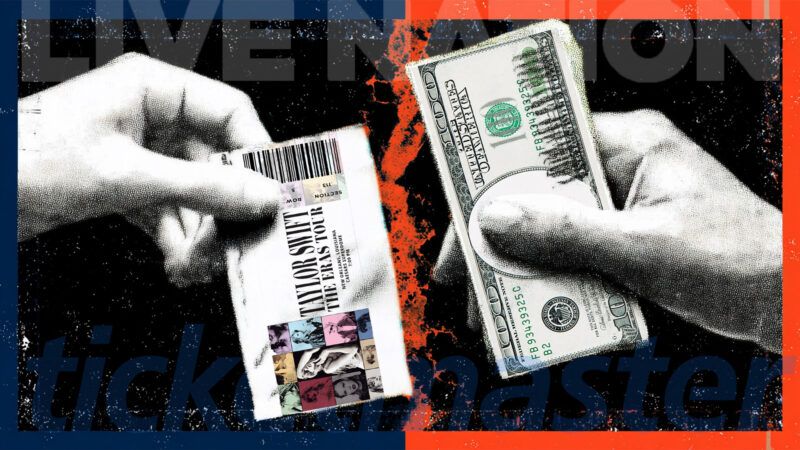Live Nation's Merger with Ticketmaster Isn't Responsible for High Resale Prices—You Are
Antitrust enforcers at the Justice Department and the Federal Trade Commission have singled out Live Nation as a scapegoat for concertgoers' insatiable appetites.

Thanks to federal antitrust enforcers, it could soon become harder for you to see your favorite band live. On Monday, Live Nation announced that it will no longer allow ticket brokers to have multiple Ticketmaster accounts following an October 10 letter from Sens. Marsha Blackburn (R–Tenn.) and Ben Ray Luján (D–N.M.) demanding answers about resale prices on the ticket-selling platform.
The company is facing lawsuits from the Justice Department and Federal Trade Commission (FTC) over the resale prices on Ticketmaster. In 2010, the Justice Department approved the merger between Live Nation, which manages venues and promotes live events, and Ticketmaster, which facilitates the sale and resale of tickets. But in 2024, the agency sued Live Nation in federal court for allegedly monopolizing primary ticketing services, concert venues, and promotion services, among other allegations.
The lawsuit was filed following public outrage at ticket resale prices during Taylor Swift's Eras Tour, which ran from March 2023 to December 2024 and saw Swifties bid up the price of tickets on the secondary market to $3,900, despite Swift setting primary ticket prices as low as $130. The primary ticket price was lower than what Swifties were willing to pay, so professional and amateur ticket brokers auctioned these below-market price tickets to the highest bidder. The fact that some fans are willing to pay nearly $4,000 to see Taylor Swift perform has nothing to do with Ticketmaster, and even less to do with its merger with Live Nation.
Despite the bipartisan condemnation of Ticketmaster for eye-watering Eras Tour ticket prices, the company doesn't act like a monopolist. In fact, the company's market share decreased by 10 percentage points following its merger in 2014, sitting at around 70 percent in 2024. Live Nation's FY 24 net profit margin of 2.8 percent—considerably lower than the total U.S. market's net margin of 8.7 percent—suggests that the firm lacks pricing power. Moreover, the profits Live Nation makes have little to do with the secondary ticket market: "Revenue from fees on concert ticket resale is less than 2% of Live Nation's revenue," the company said in a reply to Blackburn and Luján on Friday.
Economic evidence notwithstanding, the FTC sued Live Nation in September, alleging deceptive practices and facilitating the resale of tickets acquired by bots in violation of the Better Online Ticket Sales Act. This allegation ignores the fact that Live Nation has tried to crack down on "scalpers" by investing over $1 billion in antibot and other digital ticketing technologies designed "to get tickets in the hands of real fans rather than bad actors." (It bears repeating that professional ticket brokers aren't bad actors; they get tickets to fans who want to attend events really badly.)
The fact of the matter is that, so long as artists set prices below the market rate, brokers will find a way to get tickets to those who value them the most, with or without Ticketmaster. While it's politically attractive to members of Congress to blame big firms for their constituents' inability to attend their favorite band's concert, there's nothing wrong with tickets going to the people who want them the most.


Show Comments (12)